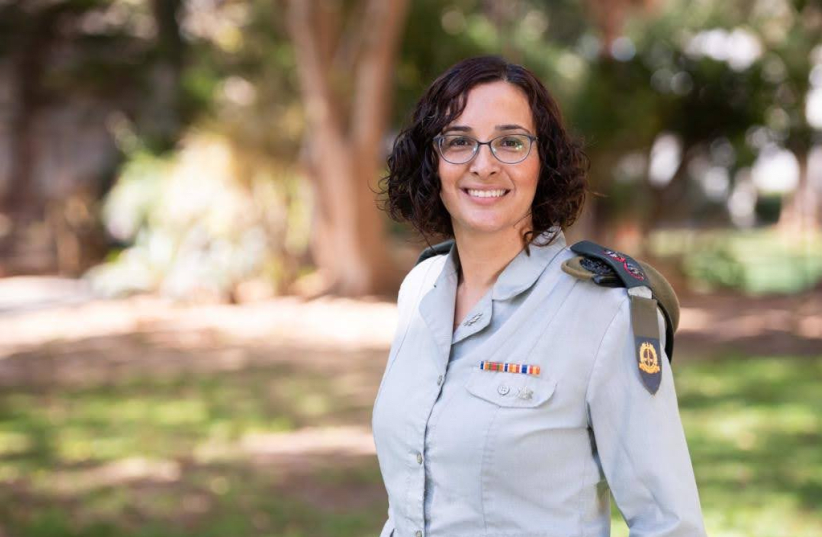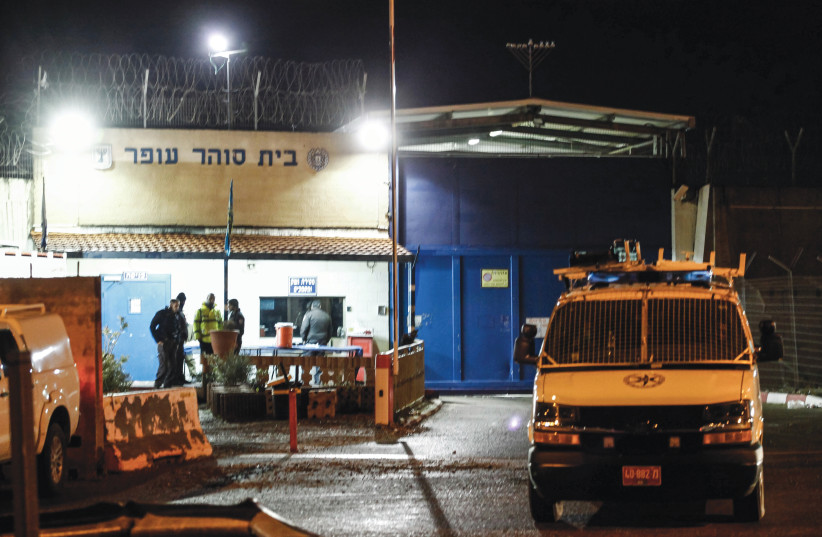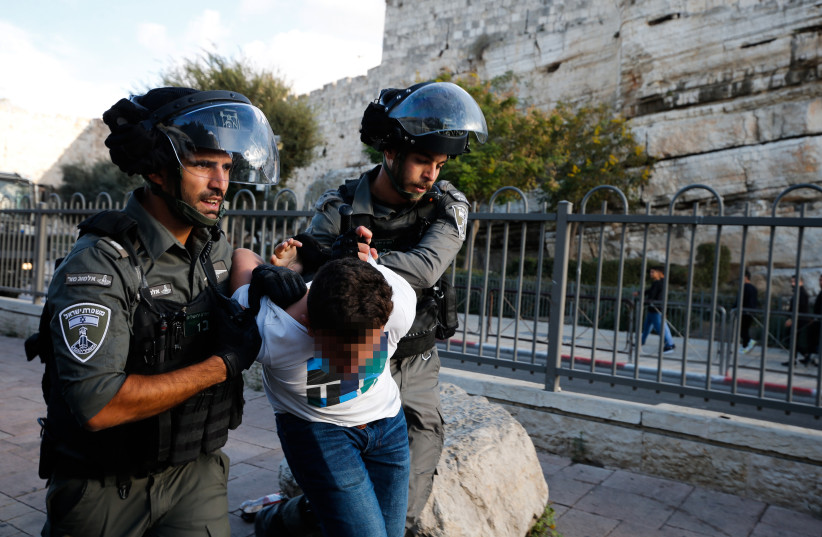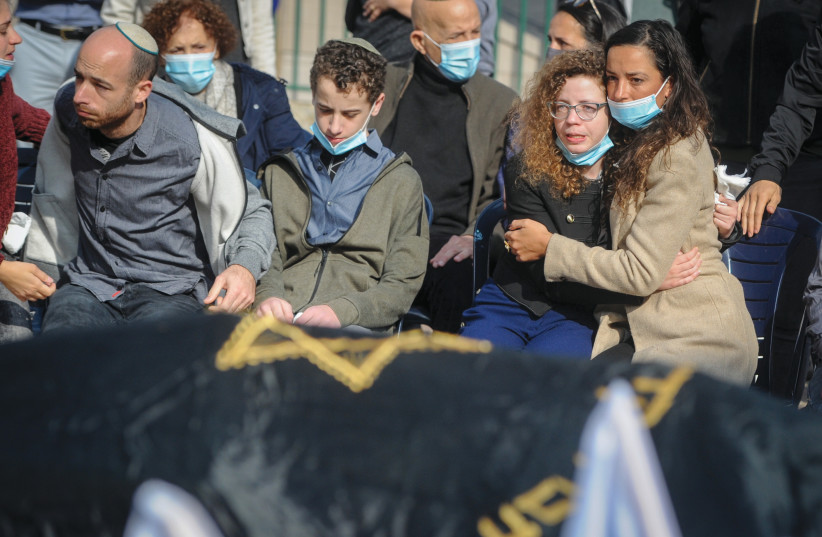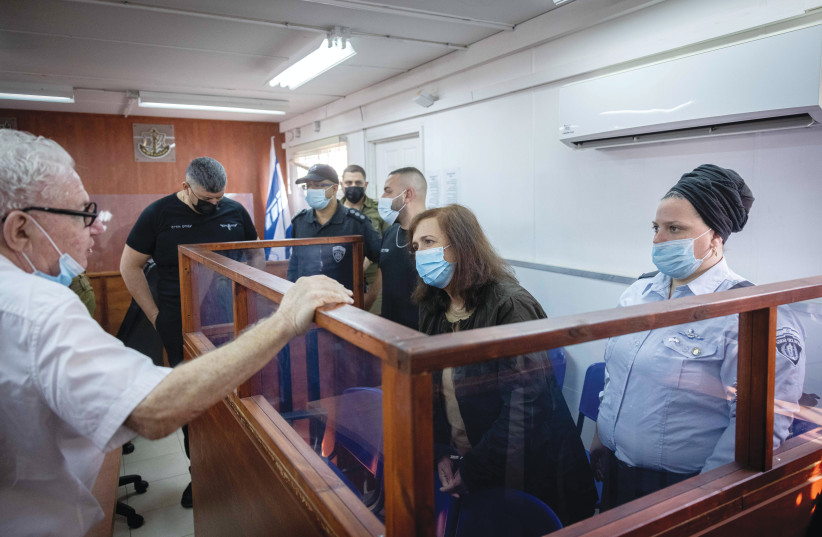A silent revolution happened in September, though no press release was issued.
The Magazine has learned that Lt.-Col. Ophira Alkabetz was replaced by Lt. Col. Matan Solomush. Each has served as IDF chief West Bank prosecutor dealing with the Palestinians, a role with both crucial international legal and political implications.
Practically no one outside of the legal community has heard of either of them. Yet, each has served as IDF chief West Bank prosecutor dealing with the Palestinians.
Alkabetz held the position from November 2019 until September, prosecuting gruesome terror trials, struggling to uphold Palestinian minors’ rights, and prosecuting Palestinian NGO officials.
She was the first female chief prosecutor, succeeding IDF Lt.-Col. Asim Hamed, the first Druze chief prosecutor. Solomush now inherits that burden, with Alkabetz promoted as the IDF’s chief public defender.
The Magazine reflects on her term, in one of the most critical and dynamic roles that exist in Israel.
RELATIONS WITH PALESTINIANS’ DEFENSE LAWYERS
According to Lea Tsemel, a leading defense lawyer for Palestinians, Alkabetz was accessible and “willing to discuss cases from multiple perspectives,” including that of the Palestinians. However, she said that Alkabetz “was not especially lenient,” and careful “to represent the positions of those sending her” in the IDF prosecution.
Leading Palestinian lawyer Khaled Alaraj complimented Alkabetz on a personal level, while critiquing the system she represents. He said she was reasonable about plea bargain negotiations and listened to defense lawyers’ claims, but could be very tough representing the IDF’s positions.
Alaraj said Alkabetz had consistent positions and confidence about representing the IDF, but helped defense lawyers with issues to avoid collective strikes.
A dissenting voice was top defense lawyer Merav Houry, who said that Alkabetz was indecisive about handling cases and held up many cases by refusing to allow her subordinates make decisions. Houry said she even held up some cases to wait for Alkabetz’s successor, hoping for better results.
Regarding Palestinians’ defense lawyers, sources told the Magazine that Alkabetz treated them with dignity and exchanges were always professional. She gave their claims serious weight even if sometimes she acted forcefully.
Before she started, some defense lawyers were concerned that as a woman, Alkabetz would be stricter than her predecessors. But once defense lawyers got to know her, they said she struck a balance between representing the IDF position, while resolving complaints about their treatment or Palestinian defendants’ treatment.
When tempers flared, she reached out to defense lawyers to rectify a situation or explain her view, so that disagreements were contextualized and did not balloon into bigger conflicts.
CORONA
Alkabetz had to run the system during the coronavirus era. Speaking to Tsemel as the fourth corona wave was subsiding and before the Omicron variant exploded into the headlines, Tsemel said that “corona is still a problem” in the courts and that “it is harder to arrange meetings with clients.”
She said that with the drop in the Delta variant, many Israeli civilian court cases are happening in-person. But in the IDF West Bank courts “many hearings are still on Zoom. This harms the human rights of prisoners to contest the charges” against them.
The defense lawyer said that access to Palestinian clients has been “a little better after the vaccines, but the lawyer-client connection is still much harder to maintain than usual.”
The IDF maintains that despite corona challenges, it always tries to assist defense lawyers in holding an ad-hoc hearing if they have some kind of emergency with a Palestinian client.
There are still many Zoom hearings, and during lockdowns sometimes hearings or communications were conducted by WhatsApp or conference calls. Asked for statistics, the IDF Spokesperson did not provide any data regarding how many hearings were taking place by Zoom or in-person, or future plans to increase in-person hearings. Rather, the IDF simply cited the rules on the issue set by the courts.
TERROR CASES
A significant theme during Alkabetz’s tenure was aggressive terror prosecutions. After the murder of Rina Shnerb in August 2019, there was broad action against the PFLP, with major arrests and indictments over two years, from high- to low-ranking officials, including those allegedly involved in terror financing.
Many officials received contributions for seemingly legitimate causes, but which were also diverted for terror purposes, according to the IDF.
If Alkabetz described her meeting with the family of Esther Horgen, murdered by a Palestinian on December 20, 2020, she would probably relate the difficulty of providing the details to family members. Going through an indictment of this terror murder, including Horgen’s last words and how much she struggled, would be challenging for anyone.
PALESTINIAN MINORS
Another issue the IDF West Bank Courts regularly deal with is its treatment of Palestinian minors suspected of crimes – a topic that attracts global media attention.
Tsemel said, “There is a different way that the IDF courts and the police deal with Jews versus Palestinians. If there is an accusation of disturbing the peace, they do not allow Palestinian minors from the West Bank or east Jerusalem to have their parents present during interrogations.
“But with Jewish minors, they would allow parents to be present. This is a blanket policy with no justification, despite dealing with the same exact charges,” she said.
The IDF rejects these characterizations and emphasizes several reforms it has undertaken in its handling of minors since 2009, taking into account that there are minors who commit violent crimes.
Still, Alkabetz would emphasize needing to be very sensitive regarding Palestinian minors because of the situation they are in. Some might want to cease criminal activity, and any low-grade criminal actions they undertook might just be a way to get out of the house.
According to the IDF, classic cases include women beaten by their fathers, or sons prevented from working. These minors take extreme actions against IDF soldiers hoping they will die or at least get put in prison to escape abusive families.
Alkabetz sometimes filed indictments choosing less serious charges when she could have opted for an attempted murder charge. The Magazine has learned she once had a defendant released during the trial, though some in the IDF wanted her to prosecute for the most severe crime possible and keep the minor in detention.
In contrast, she stayed tough regarding crimes with nationalistic motivations.
ADMINISTRATIVE DETENTION
Another issue that receives major global attention is administrative detention.
Administrative detention involves holding a Palestinian in detention usually for around six months where there is intelligence that the person is dangerous, but the intelligence cannot be produced fully in a normal criminal court proceeding without exposing the source.
It is highly criticized around the world, but in Israel is viewed as a crucial tool to save lives.
According to the IDF, there were 498 such detainees in 2017, 486 in 2018 and 512 in 2019, covering Hamed’s tenure. In 2020, the number fell to 454, but it was up to 482 as of early November.
Based on these statistics, it appears that the early corona period may have seen a slight drop in administrative detention, but the numbers went back to close to pre-corona levels during 2021.
Current IDF West Bank Court President Netanel Benishu and other top former IDF Prosecution and Israeli judicial officials have supported some reforms (but not elimination) to administrative detention. Neither Alkabetz nor other current IDF Prosecution officials seem to view these as viable or necessary.
NIGHT ARRESTS
During Alkabetz’s tenure, there was also an ongoing fight before the High Court of Justice over the handling of night arrests of Palestinian minors by the Israeli police and IDF soldiers.
In November 2020, the NGO HaMoked petitioned the High Court to compel the IDF to cease night arrests of these suspects. HaMoked sought enforcement of an existing Israeli pilot program, started in 2014, to bring Palestinian minors to the police or to court using a voluntary summons.
In the petition, the NGO said, “Contrary to its own regulations, the Israeli military arrests hundreds of Palestinian teenagers from their beds in the middle of the night, in a systematic violation of their rights.”
Lt.-Col. (res.) Maurice Hirsch, who served as IDF chief West Bank prosecutor from early 2013 until late 2016, responded to HaMoked saying that there is no international or domestic legal requirement to attempt voluntary summons or prohibiting an arrest at night; the summons program was a voluntary program undertaken by the IDF.
In August, the High Court held a hearing on the issue in which the IDF promised an update on the program by February 2022.
HaMoked criticized the IDF for saying that it would only use voluntary summons for non-security issues, and defendants suspected of security crimes would still be arrested at night. The NGO said that the IDF did not properly define “security” issues, which will mean that oversight will be difficult.
Moreover, the NGO said that it had spoken to more than 50 parents of Palestinian minors arrested since August 1, and none had received a summons. HaMoked states that this raised questions about whether the IDF is operating in good faith in its updates to the court and to the NGO.
The IDF Spokesperson’s Office responded: “The implementation of the new procedure which was declared to the High Court has started, but the data is not in the IDF’s possession at this time because the police are responsible for collecting the data and have not yet provided information to us.”
Although the police handle aspects of night arrests, IDF soldiers are often involved in making the arrests, and IDF prosecutors are often involved in handling complaints about the arrests by defendants, visiting foreign diplomats and media critics.
The November 2020 HaMoked report was based on 81 affidavits which it took from boys aged 14-17 who were arrested in 2018-2019, in which 56 out of 58 boys did not receive a summons. Many complained of a range of rights being violated during the night arrests.
In November 2020, the IDF rejected the claims of not informing parents where their children were taken by police, denial of food and drink, and exposure to extreme temperatures.
Hirsch suggested at the time that sometimes those arrested in the middle of the night might go some hours without food and it might be cold outside when they walk from the police car to the police station, but that there was no proven problematic issue.
Jessica Montell, HaMoked’s executive director said: “We expect the High Court to put an end to the use of night arrests as the military’s primary, and even exclusive, method of bringing Palestinian teenagers to interrogation. The military must exhaust all alternatives before it gets to the point of invading homes in the middle of the night, traumatizing entire families and dragging teenage boys from their beds.”
The IDF has not offered new information, and a full update may need to wait until the February 2022 High Court update.
VICTIMS’ RIGHTS
During her term, Alkabetz put a serious emphasis on giving families of terror victims an opportunity to voice their concerns.
Even if before she assumed her position, there was a trend toward victims’ rights, with an increase in their voice in criminal proceedings.
Alkabetz met personally with every bereaved family, and with victims who were physically harmed, even if an attempted murder charge was not made. It was important to her to bring their voice before the court.
Sources said she believes that it is important for the public to have faith in the system. It requires resources and lots of sensitivity to explain the difference between what some families of victims might want or expect, and how the rules of evidence, legal processes, judicial precedents and punishment policies actually work.
Alkabetz would be the first to acknowledge that there might be differences between the position of a prosecutor bound by legal norms, and the emotional position of a family member of a terror victim regarding the fate of the murderer.
PUNITIVE DAMAGES AGAINST TERRORISTS
Another major development which preceded Alkabetz’s term, but continued during her tenure, was punitive damages against Palestinian terror murderers.
In July 2019, only a few months before Alkabetz took charge, there was a ruling by the lower Judea Military Court that limited the damages for the family of murdered Duvdevan commando St.-Sgt. Ronen Lubarsky to NIS 258,000.
The IDF Prosecution appealed the ruling to the top IDF West Bank Appeals Court. From July 2019 until this past October Alkabetz supervised all of the stages of the IDF’s appeal, including legal briefs and in-person oral arguments.
Her work and the efforts of those under her led to a significant victory. The top IDF West Bank Appeals Court called on the IDF West Bank commander and the Israeli government to find a way to enforce its punitive damages rulings against Palestinian terror murderers.
Benishu, as well as Judges Lt.-Col. Ronen Atzmon and Lt.-Col. Yair Tirosh, ruled that punitive damages for terror murders could be unlimited, and granted Lubarsky’s family NIS 1,500,000 in punitive damages.
Leaving out a ceiling for damages partially took into account the difficulty of using civil wrongful death damages proceedings against Palestinians, whereas such a process is easier in Israel.
Benishu lamented that the IDF Prosecution and related law enforcement apparatuses have essentially failed to collect on these awards most of the time. He said that the IDF West Bank commander, who is always the commander for the Home Front, with support from the Israeli civilian government, should pass legislation to establish tactics and mechanisms for collecting these damages.
In lieu of such a mechanism, Benishu warned that the IDF and the government leaves the IDF Prosecution and the courts looking inept and as if their rulings are meaningless.
The NIS 1.5m. was still far less than the family and their lawyer, Hirsch, sought. Hirsch criticized Alkabetz’s prosecution team as only giving a half-hearted argument on appeal. He feels that the IDF Prosecution became less aggressive about seeking and collecting damages from Palestinian terrorists after his term ended in late 2016.
However, there is no way to compare collecting punitive damages from Palestinians in the West Bank to the same practice with Israelis. For instance, there is no set government collection agency for Israel to collect from Palestinians.
The Magazine has learned that there is sometimes more success in getting greater compensation from Palestinians in exchange for reduced jail time (in cases of bodily harm, but short of attempted murder); and where the IDF Prosecution has more discretion over how much jail time it seeks.
The IDF maintains that sometimes families will say that they don’t care how many years in prison a criminal gets – they just need money – even if it means a plea deal with a shorter prison term. Others may say they don’t care about money and want the longest jail term possible.
There is the question of whether millions in punitive damages should be dropped, if collection is unrealistic, to avoid embarrassing the courts from issuing empty rulings and wasting court time. However, even “reduced” amounts are no more likely to be collected than the NIS 1.5m. ruling.
The IDF Prosecution also might not fully support creating a new collection apparatus, since the IDF Home Front Commander would need to weigh whether the trouble caused by sending troops to collect the funds would be worth any good it might do. There are also cases in which the Palestinians are poor, and there is a minimal amount to collect.
As the sun sets on Alkabetz’s term, many of the same controversial issues that surrounded the courts before and during her term promise to continue.
A prosecutorial personality
The identities – past and present – of IDF Chief West Bank Prosecutors are generally under the radar. The exception is IDF Lt. Col. (res.) Maurice Hirsch, who served in the post from early 2013 until late 2016.
Some of it could be attributed to personality.
Hirsch wanted to leave a legacy of tougher sentences and penalties for security-related offenses, and was willing to anger Palestinian defense lawyers during plea bargain negotiations to do so.
Hirsch was appointed before the October 2015-2021 era of IDF Military Advocate General Maj, Gen. (res.) Sharon Afek, who significantly lowered the IDF legal division’s exposure to the press.
His predecessor, Danny Efrony, while not seeking media attention, had given some senior officials like Hirsch a slightly freer hand to interact with the press.
Further, Hirsch possibly had thoughts about his future advocating for Jewish-Israeli terror victims in the courts, and sought to build a greater media presence.
